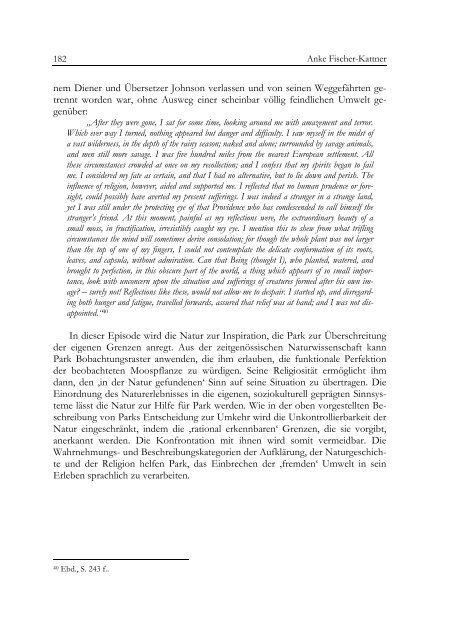Natur als Grenzerfahrung - Oapen
Natur als Grenzerfahrung - Oapen
Natur als Grenzerfahrung - Oapen
Sie wollen auch ein ePaper? Erhöhen Sie die Reichweite Ihrer Titel.
YUMPU macht aus Druck-PDFs automatisch weboptimierte ePaper, die Google liebt.
182<br />
Anke Fischer-Kattner<br />
nem Diener und Übersetzer Johnson verlassen und von seinen Weggefährten getrennt<br />
worden war, ohne Ausweg einer scheinbar völlig feindlichen Umwelt gegenüber:<br />
„After they were gone, I sat for some time, looking around me with amazement and terror.<br />
Which ever way I turned, nothing appeared but danger and difficulty. I saw myself in the midst of<br />
a vast wilderness, in the depth of the rainy season; naked and alone; surrounded by savage anim<strong>als</strong>,<br />
and men still more savage. I was five hundred miles from the nearest European settlement. All<br />
these circumstances crowded at once on my recollection; and I confess that my spirits began to fail<br />
me. I considered my fate as certain, and that I had no alternative, but to lie down and perish. The<br />
influence of religion, however, aided and supported me. I reflected that no human prudence or foresight,<br />
could possibly have averted my present sufferings. I was indeed a stranger in a strange land,<br />
yet I was still under the protecting eye of that Providence who has condescended to call himself the<br />
stranger’s friend. At this moment, painful as my reflections were, the extraordinary beauty of a<br />
small moss, in fructification, irresistibly caught my eye. I mention this to shew from what trifling<br />
circumstances the mind will sometimes derive consolation; for though the whole plant was not larger<br />
than the top of one of my fingers, I could not contemplate the delicate conformation of its roots,<br />
leaves, and capsula, without admiration. Can that Being (thought I), who planted, watered, and<br />
brought to perfection, in this obscure part of the world, a thing which appears of so small importance,<br />
look with unconcern upon the situation and sufferings of creatures formed after his own image?<br />
– surely not! Reflections like these, would not allow me to despair. I started up, and disregarding<br />
both hunger and fatigue, travelled forwards, assured that relief was at hand; and I was not disappointed.“<br />
40<br />
In dieser Episode wird die <strong>Natur</strong> zur Inspiration, die Park zur Überschreitung<br />
der eigenen Grenzen anregt. Aus der zeitgenössischen <strong>Natur</strong>wissenschaft kann<br />
Park Bobachtungsraster anwenden, die ihm erlauben, die funktionale Perfektion<br />
der beobachteten Moospflanze zu würdigen. Seine Religiosität ermöglicht ihm<br />
dann, den ‚in der <strong>Natur</strong> gefundenen‘ Sinn auf seine Situation zu übertragen. Die<br />
Einordnung des <strong>Natur</strong>erlebnisses in die eigenen, soziokulturell geprägten Sinnsysteme<br />
lässt die <strong>Natur</strong> zur Hilfe für Park werden. Wie in der oben vorgestellten Beschreibung<br />
von Parks Entscheidung zur Umkehr wird die Unkontrollierbarkeit der<br />
<strong>Natur</strong> eingeschränkt, indem die ‚rational erkennbaren‘ Grenzen, die sie vorgibt,<br />
anerkannt werden. Die Konfrontation mit ihnen wird somit vermeidbar. Die<br />
Wahrnehmungs- und Beschreibungskategorien der Aufklärung, der <strong>Natur</strong>geschichte<br />
und der Religion helfen Park, das Einbrechen der ‚fremden‘ Umwelt in sein<br />
Erleben sprachlich zu verarbeiten.<br />
40 Ebd., S. 243 f..

















